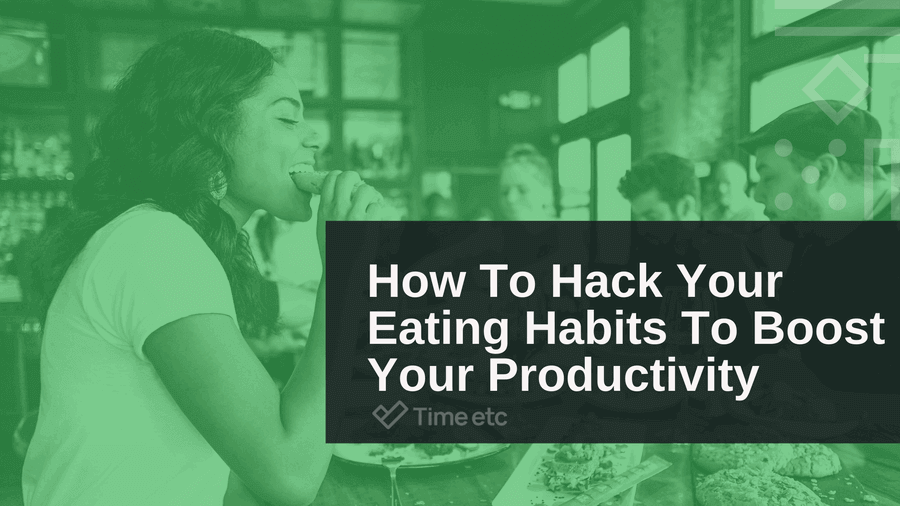When you look up how to be more productive at work, you probably don’t expect to be told to grab a snack. But it turns out food plays a far bigger role in productivity than most people realize. In fact, how, when, and what you eat are all important factors in staying focused, motivated, and energized on the job.
And the best news is, when you dig deep into food science and learn how to optimize your diet for greater productivity, you can take advantage of feeling happier, healthier, and more energetic in every aspect of your life.
So let’s dive in!
Don’t work on an empty stomach
You’ve probably heard many times how you shouldn’t skip breakfast, but missing any meal can have a negative impact on your day.
At its most basic, hunger is your body’s equivalent of its fuel warning light coming on, signaling that you’re running low on vital energy. And it can be tough to focus on important tasks when your stomach is growling.
Other than distracting you from your work, hunger can also affect how well you make decisions. Hungry people are less likely to delay gratification, which can lead to more impulsive — and ultimately less rewarding — behaviors. A recent study found that participants who made decisions on an empty stomach were more likely to favor “smaller but sooner” rewards over “larger but later” rewards.
And believe it or not, being “hangry” is a real thing! Research has found that judges give harsher sentences when they’re hungry. You may not be handing out sentences, but you could inadvertently become less cooperative at work if you haven’t eaten in a while.
Schedule regular mealtimes
Eating on a regular schedule not only keeps hunger pangs at bay, but also helps to maintain your circadian rhythm, or internal body clock. Circadian rhythms mainly affect your sleep patterns, but they also play a role in other physical functions, like your hormones, body temperature, and eating habits.
So, optimizing when you eat can also affect your sleep quality and stress levels. An article published in the British Journal of Nutrition explains that the circadian clock system is deeply influenced by nutritional intake. What food people eat — and when they eat it — has the ability to reset biological rhythms and realign their internal clock with a new schedule.
The article goes on to reveal that abandoning regular eating patterns due to the demanding life of 24-hour societies may have a profound effect on long-term health and well-being. This means that in order to stay at your most active, productive, and healthy, you need to make food a priority, not an afterthought.
For example, if you tend to skimp on food during the day and only eat a large meal at night, your body will likely equate this to your first meal of the day. Thinking it’s breakfast, your body will convert this food into energy, and you’ll find yourself fired up at night rather than slowly winding down for sleep.
This, in turn, can negatively impact how you feel and how productive you are throughout the following day, as studies have found disrupted sleep can negatively affect your attentiveness, ability to reason, and moods.
Bonus tip: If you struggle with sleeping problems, your last meal of the day could provide a solution. Tryptophan is an essential amino acid that the body uses to help make the hormone serotonin, which can then create melatonin, which helps to regulate your sleep cycle.
In order for tryptophan to reach its full potential, experts suggest pairing it with a healthy carbohydrate. In an evening meal, this could be poultry or tofu with brown rice, and a light snack could be a glass of milk and some low-fat crackers, for example.
Say “yes” to snacking
Let’s be honest, who can honestly say they do their best work when they have no energy and can’t concentrate? Your parents may have warned you that snacking will “spoil your appetite”, but healthy snacking may actually be the unsung hero of productivity.
You might think the ability to focus on your work is purely mental, with little to do with what we eat. But according to research into self-control and willpower, the ability to regulate behavior is strongly linked to glucose, or blood sugar, in our bodies.
In addition to regulating energy levels, blood glucose is a major energy provider for self-control behavior, such as controlling attention, regulating emotions, coping with stress, and resisting impulsivity. You need relatively large amounts of blood glucose to perform these actions well, so when levels are low, failures are more likely to occur. Hello, afternoon procrastination!
Healthy snacks will keep you more energized and alert throughout the day, and prevent your blood sugar from dropping in the gaps between meals. But if you find yourself in a mid-day slump with zero motivation to focus on work, simply restoring glucose levels is usually enough to improve self-control, so grabbing some fruit, nuts, seeds, an oat bar, or protein bar will help to get you back on track.
Don’t resist temptation, remove it
When we’re in the middle of a busy workday, the deciding factor on what we choose for lunch usually boils down to whatever is the quickest, easiest, and most convenient on offer. But unfortunately, the quickest, easiest, and cheapest options also tend to be the unhealthiest.
It might feel like the most efficient choice at the time, but any time, effort, and money you save are likely to come at a cost to your performance later on in the day. As we’ve learned, willpower and self-control are linked to glucose, so the act of resisting temptation and choosing a healthier option itself will deplete your blood sugar levels and leave you with less to power your ability to focus later on.
So the most effective solution is not to “get better” at resisting temptation, but to make the best options the easiest options possible.
A great place to start is to prepare your lunch the night before. This will save you time the following day, and it’s one less decision to worry about!
If you know your day is going to be busy, full of important decisions, tough tasks, or crucial deadlines, make sure you have snacks easily available to you to keep your blood sugar at a steady level throughout the day.
But if you don’t have time to make your meals beforehand, try to decide what you’ll eat for lunch before your break. As we mentioned earlier, an empty stomach can lead to more impulsive decision-making rather than choosing the options with the largest and more long-term benefits.
The best foods for your brain
I’m sure it comes as no surprise to hear that fruit and vegetables top the list for an optimized diet, but if you’re keen to power your brain with the most effective nutrients, these foods in particular are a great place to start.
Leafy greens
Leafy greens, like kale, spinach, and Romaine lettuce, are an excellent source of important nutrients, including iron, magnesium, and vitamins A, C, and K. Each of these plays a large role in memory and cognitive function.
Magnesium supports healthy brain development, memory, and learning, and there is a growing interest in the relationship between vitamin K and cognitive function. Also, a 2015 study found that participants who ate more fruit and vegetables reported higher average eudaemonic well-being, “a state of flourishing characterized by feelings of engagement, meaning, and purpose in life”. The participants who ate more fruits and vegetables also experienced more intense feelings of curiosity and greater creativity compared to those who ate less.
Whether it’s a side salad with dinner or an ultra-green smoothie to perk you up in the morning, make these powerhouse foods a staple in your diet to reap their benefits. If you aren’t keen on the bitter taste a lot of greens have, you can offset them by adding some fruits. For example, you can sweeten up a kale and spinach smoothie by adding a banana and a handful of strawberries.
Oily fish
Oily fish is rich in omega-3 fatty acids, which make up half the fat found in your brain. Our brains use these fats to build nerve cells, which are strongly linked to learning and memory.
Providing your brain with enough nutrition is crucial to improving your cognitive performance — this includes being able to break down and process information, make informed decisions, and draw important conclusions.
The best oily fish for brain health are salmon and tuna, but you can also benefit from sardines and herring. Salmon and tuna can be enjoyed alone on a bed of greens, or as a tasty addition to salads.
Dark blue and purple fruits
Produce that appears dark blue or purple contains anthocyanins, which have strong antioxidant and anti-inflammatory properties. Studies have linked anthocyanins to reduced rates of cognitive decline in older adults, and they have even been named “neuroprotective agents for brain diseases”.
Blueberries are rich in anthocyanins, but blackberries, blackcurrants, raspberries, plums, and red cabbage are also excellent sources of these health-boosting compounds. If you’re looking for healthy snack options, try a small bowl of blueberries, antioxidant-rich walnuts, and a healthy cheese that supports brain function.
Nuts and seeds
Nuts and seeds are a diverse group of foods that can suit any flavor palate. There are many benefits associated with nuts and seeds, but a recent study has found that regularly eating nuts can strengthen the brainwave frequencies linked to cognition, learning, memory, and other brain functions.
You can enjoy them on their own as a snack, or as a salad topping with some protein for a well-rounded, healthy meal.
What's The Bottom Line?
In terms of productivity, the importance of what you eat, and when, is often overlooked but cannot be overstated. By understanding the power of nutrition and heeding its advice, you can provide your body with just what it needs to help you work at your best to reach your greatest potential.







